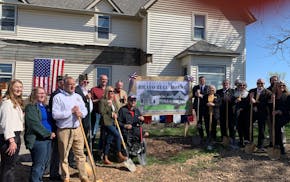Even as the green movement is taking off, the eco-oriented Green Institute is wilting financially.
The south Minneapolis nonprofit that has campaigned for sustainable lifestyles for 15 years now finds its own future in doubt.
Growing wary of its role as the institute's chief creditor, the city is pondering what action to take on its chronically overdue debt payments. One option is foreclosure on the institute's flagship building, which was designed with the latest energy-saving technology as an incubator for green businesses.
"It's a definite possibility that we're going to be closing the doors," said Jamie Heipel, the group's executive director, barring an agreement with the city.
The institute has served an important role in translating green thinking from the conceptual level to practical advice for people, neighborhoods and small businesses, said Hennepin County Commissioner Peter McLaughlin.
McLaughlin was an important early supporter.
The institute's building features much of the green technology it espouses -- such as passive solar, solar collectors and a green roof.
The institute, which is just off Hiawatha Avenue behind the Hi-Lake shopping center, is best known for its three ReUse Centers that sell used building materials and various environmental education programs.
It has thrived on loans and grants from public sources over its history. But it also used debt like a cash machine and now is in over its head, according to Heipel, who inherited the issue.
The nonprofit has worked aggressively to cut costs over the past two years, Heipel said. But demand for its used materials has been sporadic, both because of a faltering economy and insufficient cash to market its wares.
"There's a lot of people that don't know about us," Heipel said.
The institute is closing the Osseo branch of the ReUse Center, which was making a scant profit. The main center on 21st Avenue S. and a branch in Maplewood with lower startup costs will continue.
The institute is also raising the remaining below-market rents to tenants as their leases expire at the flagship center on 21st Avenue S. It is shrinking the amount of space it occupies there so it can rent out more space in the fully occupied building. That will help cash flow, Heipel said.
The Green Institute was born of a resident fight against a huge garbage-handling station proposed by Hennepin County for the portion of the Phillips neighborhood where the eco-center now stands. It served as something of a symbol of local self-determination -- albeit heavily subsidized -- for the low-income east Phillips area.
But now nearly $60,000 behind on city loans for its flagship facility, the nonprofit institute could be near the end of its road.
"We're upside down right now," said Heipel.
The city's Finance Department recently recommended that the city either install a leasing agent for the building or buy out first lender Western Bank and foreclose, eventually selling off the building. But that recommendation has been pulled back for more deliberation.
The bigger of the two loans was made by the city in 2002 for a $3.5 million refinancing of the debt on the eco-enterprise center.
When the institute missed payments and private lenders refused to front the delinquent amount, the city last year converted that delinquency into a second loan for $216,189. The city offered an interest-rate break if the institute made payments on time, but it fell behind in only three months.
Cash has trailed debt
Heipel said that despite cutting expenses, the cash flow hasn't been sufficient to cover all debt payments.
He said some of the city's past loan terms helped the institute to get through short-term cash crunches or to finance building improvements. But they were detrimental in the long term that has now arrived, Heipel said.
Patrick Born, the city's chief finance officer, said that since the building once generated enough cash to keep current on the city loan, a less draconian option would be to install a building manager. But city attorneys aren't sure the city has the power to force that, and that also adds to expenses.
Another option would be to pay off the bank that has the first mortgage and foreclose. That gives the city more control but puts it in the unfamiliar role of managing rental property.
Steve Brandt • 612-673-4438

Hennepin County Attorney inks contract with D.C. law firm to prosecute trooper Londregan case

Defense attorneys in Feeding Our Future trial cast doubt on FBI's meal fraud investigation

Protesters hold dueling Gaza rallies at University of Minnesota

Overdose deaths spike after incarceration, but Minnesota jails lack treatment

